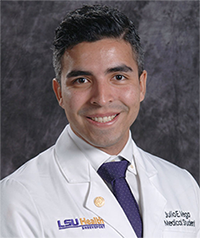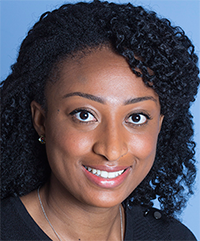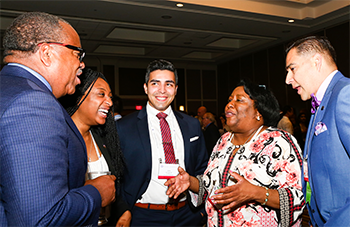Choosing the right mentor is an essential part of any career, whether you are a medical student or ophthalmology resident. However, it’s not just picking a mentor that’s important — you need to build a lasting relationship. A good mentor can be an enduring source of support and encouragement, whether he or she shares your subspecialty or not.
Mentorship During Medical School
For medical student Julio Vega, ophthalmologist mentor Robert Melendez, MD, MBA, has helped him move toward choosing a specialty. “Sometimes it’s very difficult to take the first step towards a certain career direction,” said Vega, a fourth-year student at Louisiana State University in Shreveport.
“Just talking with someone who’s been along that same path and hearing their story has been one of the most useful things that I’ve experienced as a medical student — it’s invaluable information that you can’t find in a textbook or online.”

Julio Vega.
With the help of Dr. Melendez, Vega participated in a pilot Student Engagement Program at AAO 2016 and later attended Mid-Year Forum 2017.
“I wanted him to see the inner workings of ophthalmology,” said Dr. Melendez. “It was an excellent opportunity to meet a number of leaders in our field and get inspired by their energy.”
Vega said he has been equally inspired by Dr. Melendez. “Through him, I have learned that passion and dedication can help you create a successful practice and become a respected leader in your community,” Vega said. “He’s really changed the way I think about medicine and being a physician.”
Mentorship During Residency

Akosua Nti, MD.
By contrast, University of Pennsylvania/Scheie Eye Institute resident Akosua Nti, MD, had already chosen ophthalmology when she met mentor, Eydie G. Miller, MD. Although they have different subspecialty interests, Dr. Miller guided her through the match process, encouraged Dr. Nti’s research and has helped hone her surgical skills.
She also introduced Dr. Nti to the world of advocacy and helping patients outside the clinic. “I had never been exposed to any type of advocacy work before,” said Dr. Nti, “but she encouraged me to dive into the political issues affecting ophthalmology.” Sponsored by the National Medical Association-Ophthalmology Section, Dr. Nti attended Mid-Year Forum 2017 as part of the Advocacy Ambassador Program.
While there, Dr. Nti shadowed Dr. Miller and another mentor, Mildred M. G. Olivier, MD, FACS, during Congressional Advocacy Day. They briefed her on top legislative issues and talking points and gave tips for effective lobbying before their meetings with members of Congress. She also met other leaders who can provide future guidance, including Chasidy Singleton, MD, president and councilor for the NMA-Ophthalmology Section, Dr. Nti’s sponsoring society.
Dr. Nti said it was a career-changing experience. “Because of the Mid-Year Forum, I now know that advocacy is just one more way that I can care for my patients,” Dr. Nti said. “Even as a resident, you can explain to your legislators how their decisions directly impact patients. This is powerful for a young ophthalmologist — to know that I can actually make a difference and be a resource for policy makers.”
How to Find a Mentor

2017 Academy President-Elect Keith Carter, MD; Akosua Nti, MD; Julio Vega; Mildred M. G. Olivier, MD, FACS; and Robert Melendez, MD, MBA.
There’s not an exact road map for finding the right mentor. But Dr. Nti and Dr. Olivier said YOs should keep these tips in mind:
1. Be open. When you first interact with a potential mentor, try to have an honest interaction and get a good feel for the person. “Oftentimes when you meet someone, you’re not even thinking that they’ll become your mentor,” Dr. Nti said. “But share a bit about yourself, and the two of you might just click.”
Your mentor may not be in your subspecialty — some of Dr. Nti’s first exposure to retina came from her mentor Graham E. Quinn, MD, a pediatric ophthalmologist. And they may not even be in medicine at all. “That person you know outside of medicine might help you think about your career in an entirely different way.”
2. Don’t limit yourself to one. Multiple mentors can help guide you through the different stages of your career. “It’s important to continue to receive mentorship throughout your professional life,” said Dr. Olivier. “I started out with a mentor who molded me into a glaucoma specialist. But over the years, I’ve also needed additional mentors to help me think about retirement, bringing other colleagues into practice and establishing the best work-life balance.”
3. Be proactive. Many medical students and residents will approach a professor and say, “I want you to be my mentor.” Setting that expectation is important, said Dr. Nti, but the work is not on the other person. “You are the one that has to engage them, follow-up with them, and establish a relationship.”
And as Vega can attest, you can create a long-term professional and personal relationship that will build over time. “Our relationship has developed to the point where I not only see Dr. Melendez as a mentor, but also as a friend and a great role model,” he said. “I hope to someday pass on the wisdom and support I have been fortunate to find with him!”
For more information about how you can attend the Mid-Year Forum, including Congressional Advocacy Day, as part of the Advocacy Ambassador Program, contact Gail Schmidt, the Academy’s director of ophthalmic society relations.
* * *
About the author: Mike Mott is a former assistant editor for EyeNet Magazine and contributing writer for YO Info.